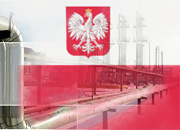For more than a year, its negotiations with Russia of a new agreement for higher deliveries have been a major headache.
Poland has been undersupplied with Russian gas since the early 2009, when RosUkrEnergo — a mysterious Swiss-registered 50-50 venture between Gazprom and Ukrainian businessmen — was squeezed out from the Ukrainian market.
The company used to deliver 2.3 billion cubic meters of gas a year to Poland through Ukraine, but hasn’t been able to do that since it fell out of favor and was forced out of the market after the Russian-Ukrainian gas conflict in early 2009.
RosUkrEnergo isn’t thus expected to return to honoring its agreement to Poland. Therefore, the country has to turn straight to Gazprom, its other supplier. It has saved itself several times using spot deals, but this time the shortfall is too big.
Poland’s gas infrastructure makes it reliant on supplies from Russia, which offers Gazprom a leverage to kill several birds with one stone: the company may deliver higher volumes, but not before it uses the chance to strengthen its position in Poland for years to come.
The country has been negotiating a revised gas supply contract with Gazprom for almost two years, dragging its feet to avoid caving in to the giant that wants to keep gas prices linked to the prices of oil, and make sure Poland continues to take high volumes even if it diversifies its supplies. Gazprom also wants a Poland-registered venture in which it is a shareholder to forgive some of the debts the Russian firm owes for gas transit through the country.
In December 2009, Poland announced that it reached a deal that, critics say, would largely satisfy Russia’s demands. But it hasn’t been able to sign it despite approving it in March, saying for months that the signing ceremony was imminent. Under the deal, Gazprom is to increase its supplies to Poland by about 2.5 billion cubic meters of gas a year to some 10 billion cubic meters. The countries also agreed to extend the contract until 2037.
One other issue is also becoming crucial: Gazprom also wants to keep control over the Polish section of the Yamal-Europe gas pipeline to Germany and doesn’t want to allow other companies to use it. This would violate the European Union’s law and has prompted the European Commission to step into the negotiations.
On Sep. 20, PGNiG, the Polish gas monopoly, issued a loud public warning that it won’t be able to deliver gas any more starting in late October, because it will run out of gas, as the contract hasn’t been signed. Some analysts said the PGNiG threat marks an effort by the Polish utility to pressure the European Commission to close an eye on certain provisions of the contract. But transparency in running energy infrastructure and guarantee of access to pipelines by third parties are core stances of the EU policy.
On Friday, the Polish government said it was close to reaching a deal, and that final talks have been scheduled for early October. Some experts see those assurances as slightly too optimistic, but still the most likely scenario is Poland will eventually sign the agreement for fear of shortages after finding a way to observe EU rules, if only on paper.
"The Wall Street Journal"
07 Февраля 2026 | суббота | 11:52


